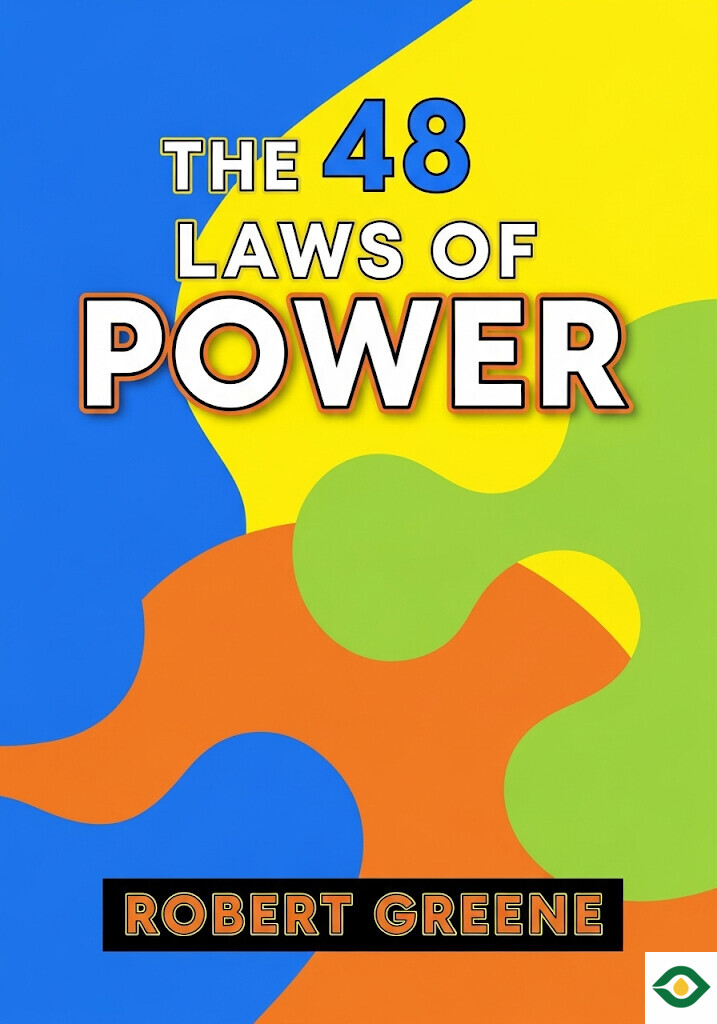Description
Power is one of the oldest forces in human life. Whether in politics, business, or personal relationships, people are constantly competing for influence. Some do this openly, while others move in silence, using strategy and patience. Many try to ignore power, calling it unfair or even immoral, but ignoring it doesn’t make it disappear. Those who understand how power works will always have the upper hand over those who pretend it doesn’t exist.
Robert Greene’s The 48 Laws of Power explains how power has been gained, lost, and fought for across history. The book collects lessons from rulers, generals, inventors, artists, and leaders. These stories show us that power is not only about strength but also about timing, perception, and psychology.
One of the first lessons is that you should never outshine your superior. People in authority want to feel important. If you make them look weak or less impressive, they will likely turn against you. Nicolas Fouquet, a finance minister in France, learned this the hard way when he threw a grand party to impress King Louis XIV. Instead of being rewarded, he was arrested and spent the rest of his life in prison. By contrast, Galileo Galilei gained influence by making the Medici family feel glorious. He dedicated his discovery of Jupiter’s moons to them, presenting it as a cosmic symbol of their greatness. This made him their official court philosopher, securing him funding and prestige.
Another law teaches that credit is as valuable as work itself. Nikola Tesla worked tirelessly to improve Thomas Edison’s inventions, but Edison claimed all the recognition. Power often goes not to the one who works hardest, but to the one who takes credit. Protecting your own work and learning how to claim recognition for it is essential if you don’t want to be erased from history.
Understanding people is also a powerful tool. Spying, observing, and even posing as a friend can reveal what others want, fear, or plan to do. Joseph Duveen, an art dealer, gained the trust of Andrew Mellon by secretly learning his preferences and pretending to share them. Mellon later became his biggest client. Information gives you control, because when you know what others value, you can guide them without force.
Sometimes, power is gained not by strength but by unpredictability. If your opponents know your habits, they can predict and block your moves. But if you act in ways they cannot guess, they will hesitate. Chess champion Bobby Fischer used this method against Boris Spassky in 1972. He broke patterns, confused his opponent, and ultimately won the world championship.
Surprisingly, surrender can also be a form of strength. When faced with an enemy too strong to defeat, giving in can buy you time and safety. The German playwright Bertolt Brecht survived questioning by U.S. authorities during the Cold War by calmly cooperating while his peers fought aggressively. His politeness saved him, while his fellow writers were blacklisted. By appearing weak, Brecht kept his freedom and lived to fight another day.
Power also depends on how you present yourself. If you want to be seen as important, you must act important. King Louis-Philippe of France tried to act like a commoner, but this made both rich and poor despise him. By contrast, Christopher Columbus behaved like royalty even before he had achieved fame, and this confidence helped him win support from Spain’s rulers. People believe what they see; if you act with authority, others will treat you as if you truly have it.
Force is often tempting, but seduction is more effective. Chuko Liang, a Chinese strategist, defeated his enemies by capturing them and then releasing them with kindness instead of punishment. Each time, his opponent expected death but received generosity. Eventually, the enemy surrendered willingly, bound by gratitude rather than fear. This shows that winning people’s hearts can bring longer-lasting power than forcing them into submission.
Friends, while comforting, can sometimes be dangerous allies. Friends may envy you or betray you when your success grows. History shows many leaders who were destroyed by those closest to them. Strangely enough, enemies can sometimes make better partners. The French minister Talleyrand worked with his old rival Fouché to bring down Napoleon. Their alliance was successful because it was built not on friendship but on shared interest.
Another law is to avoid arguing and instead prove your point through action. Arguments make people defensive, but clever actions show results without creating resentment. Architect Christopher Wren, when ordered to add unnecessary columns to a building, built them—but left them just short of touching the ceiling. They looked supportive but did nothing. Years later, it was discovered that he had been right all along, without ever having to argue.
When asking for help, it’s best to appeal to self-interest rather than morality. People are more willing to help when they see personal benefit. The Dutch won trading rights in Japan because they offered exactly what the Japanese wanted—access to European markets. The Portuguese, who pushed only their own religious goals, were rejected. Appealing to what others desire creates cooperation, while appeals to duty or gratitude often fail.
Scarcity also creates value. Being too available makes people take you for granted. The ancient leader Deioces gained power by withdrawing from public life until people begged him to rule. Once they realized how much they needed him, they built him a palace and made him king. Distance and unavailability can make others respect and desire your presence.
Finally, isolation is dangerous. Some rulers tried to hide in fortresses, believing it would keep them safe, but it cut them off from information and influence. Emperor Ch’i Shih Huang Ti of China isolated himself so much that he died alone and powerless. Louis XIV, on the other hand, surrounded himself with nobles at Versailles. By keeping them close, he observed, influenced, and controlled them. Power thrives in connection, not in walls.
The main lesson of these laws is that power is always active. Whether we like it or not, people are competing for influence. We cannot escape this game, but we can choose how to play it. Sometimes the best move is humility, sometimes boldness, sometimes patience, and sometimes retreat. What matters most is awareness.
By studying the successes and failures of history, we can avoid common traps. We learn not to offend those above us, not to waste time arguing, not to give away credit, and not to overexpose ourselves. We also learn to be unpredictable, persuasive, and patient.
Power is not about cruelty or selfishness alone; it is about knowing human nature and using it wisely. The world has always been shaped by those who mastered these strategies. And while times change, the rules of influence remain the same.
If you understand them, you don’t just protect yourself from being manipulated—you also gain the chance to rise, to lead, and to shape your own destiny.





